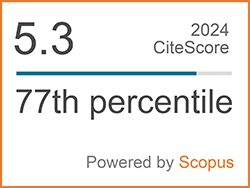Effect of Oscillating Magnetic Field on Freezing Rate, Phase Transition Time and Supercooling of Deionized Water
Abstract
Due to a growing interest toward quality improvement of frozen foods, many advanced technologies have been combined with conventional freezing system to expedite rate of freezing and reduce ice crystal formation. This research aimed to investigate the effect of oscillating magnetic field (OMF) in the range of 0 to 12 mT (50 Hz) on freezing rate, phase transition time and supercooling of deionized water during freezing in an air blast freezer at –10°C. The sample was placed between two magnetic cores where an oscillating magnetic field (OMF) was generated and the temperature profile was recorded by a data logger at 1-minute interval. The magnetic field strength was varied at 0, 4, 8, and 12 mT. It was found that there was no significant difference in the freezing rate and phase transition time when different OMF strengths were applied (p > 0.05). Interestingly, the probability of supercooling occurrence increased when the OMF was applied; without OMF only 16% of the experiment exhibited supercooling phenomenon where 33% was detected when OMF in the range of 4–12 mT was applied. However, the probability of supercooling occurrence was independent of the OMF strength.
Keywords
DOI: 10.14416/j.asep.2019.08.001
Refbacks
- There are currently no refbacks.
 Applied Science and Engineering Progress
Applied Science and Engineering Progress







